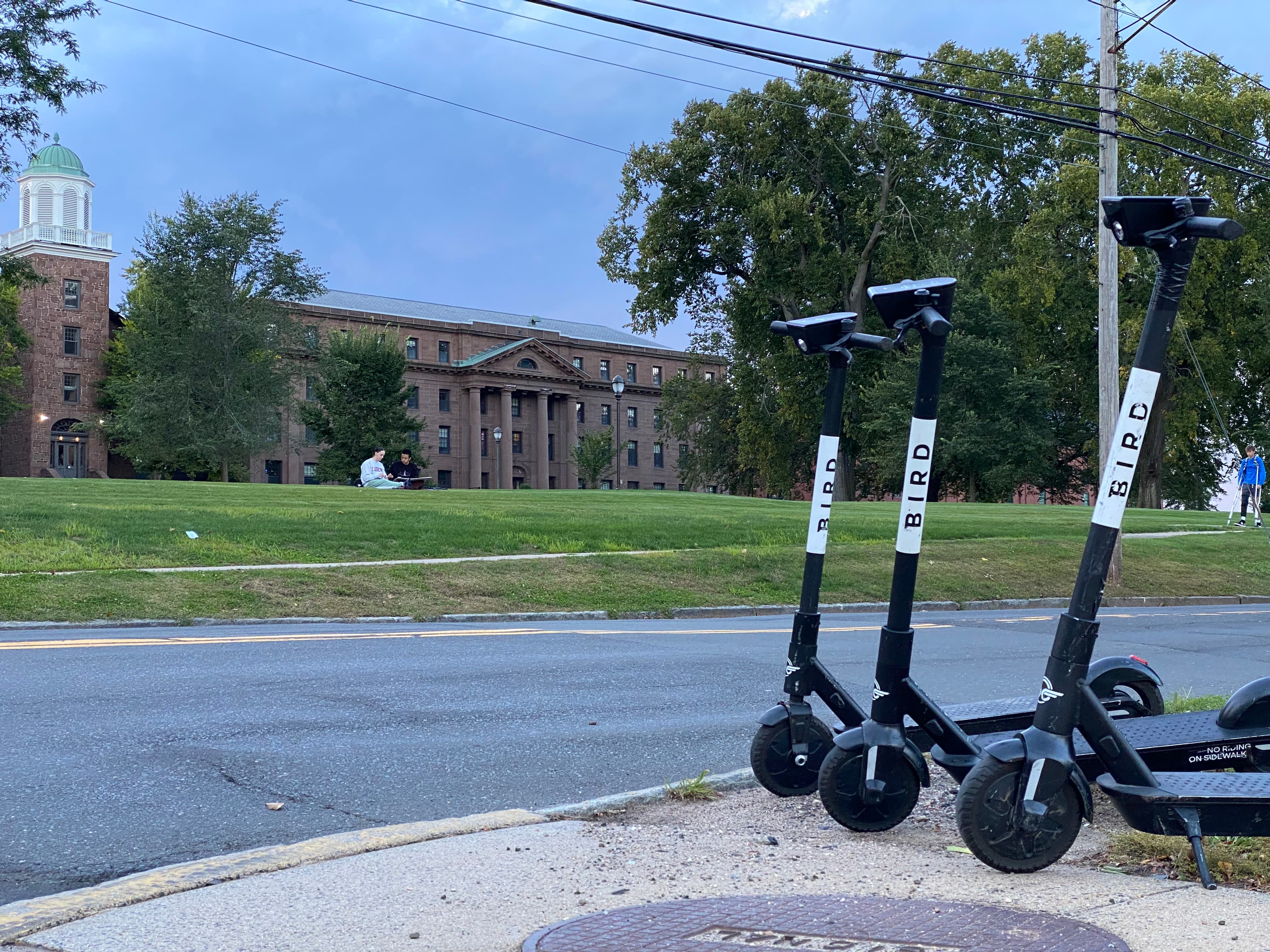
“A Flock of Birds,” c/o Andrew Lu, Assistant Photo Editor
As part of a Middletown sustainability initiative, Bird electric scooters and bicycles have been placed around the University’s campus since Wednesday, Sept. 7, 2022, shortly after the start of fall semester classes. Anyone over 18 years old can ride the scooters and bikes by downloading the Bird app and scanning a scooter or bike to start the session. It costs $1 to activate the vehicles and $0.49 per minute of use.
In recent years, Bird electric scooters have become massively popular—not just among individual riders, but also in terms of partnerships between companies and larger cities. This partnership has now come to the University, where Bird scooters and bikes are scattered across sidewalks on campus among other locations throughout Middletown.
Eco Facilitator Kiran Kling ’23 worked with Middletown city officials last year to bring Bird scooters and bikes to Middletown. This is not the first time a partnership between the city and a sustainable bike-sharing company has been attempted at the University. In Spring 2018, the University partnered with Spin Bikeshare, a rentable bicycle company with docking stations, much like CitiBikes in New York or BlueBikes in Boston. The partnership ended, however, as the company went bankrupt nationally in 2021.
“[Spin] also failed economically here in Middletown because they were trying to just serve Wesleyan’s campus which was not a large enough market,” Kling said. “People were riding their bikes down to Junior Village and they didn’t want to ride back up the hill and the bikes would pile up.”
Kling used this past failure to structure his proposal to Middletown, emphasizing that Bird’s electric fleet is better suited for Middletown’s hills and the importance of involving both Middletown and the University in the bike-share partnership. In addition to forming an economically viable clientele for Bird, combining the areas will help improve transportation between Middletown and Wesleyan. Kling hopes that Bird’s fleet can improve relations between University students and Middletown residents.
“It wasn’t just so students can go into town,” Kling said. “It was so town could come to campus. We have all these wonderful events on campus like outdoor films and concerts and events and plays that should be accessible to the Middletown community.”
Another benefit of the Bird scooters is that they create a gig economy by hiring Bird Scooter Chargers. By creating an account through the Bird app, anyone over 18 years old with a Social Security Number can apply to be a Bird Charger. Once approved, Bird sends charging cables for the Charger to keep at their home. Then, at night, the charger “harvests” the scooters to charge overnight and “serves” the scooters to their appropriate “nests” in the morning. The payment for charging a Bird scooter can range anywhere from $3 to $20 per scooter, depending on how scooter-populated the area is.
“It’s a pro of Bird scooters to Middletown in general,” Kling said. “It’s a cash injection to the local economy.”
According to Cole Ward ’25, who uses the scooters two to three times a week, the Bird scooters are a great form of transportation. Ward frequently rides the scooters between the Freeman Athletic Center and Fisk Hall.
“I have like 10 minutes to get there from the athletic center,” Ward said. “So I have to use the Bird scooters, so it’s pretty convenient they’re there.”
Others have used the scooters as a fun activity, something to do with friends. Sylvie Pingeon ’25 has been wanting to try an electric scooter for a while. She described her first use of a scooter on campus.
“I just did a little loop 100 yards there and back and then got off the scooter,” Pingeon said.
Although Pingeon has never actually ridden the scooters to get to a particular destination, she still likes that they are on campus.
“I like to have it as a possibility that I could scoot anytime I wanted to,” Pingeon said. “The actual scooting feels less important to me.”
However, the Bird scooters may pose potential setbacks to some. Catherine Hou ’26 has used the scooters two or three times, including a ride to the CVS on Main Street, which cost her $10. Hou chalked up some of the cost to her friends learning to ride and, therefore, riding slower, but still expressed concerns about the cost.
“It’s not the most expensive but it definitely adds up,” Hou said.
In addition to pricing issues, some safety concerns have risen about Bird scooting while under the influence. Kling, aware of this while working on his proposal, requested that the Bird scooters be shut off on Friday and Saturday nights. Although Bird has not implemented this yet, Kling says he will continue to pursue this issue.
As long as safety guidelines are followed, Ward believes Bird scooters and bikes are worth a try.
“It’s fun and fast—it gets you where you need to be and it’s a good time,” Ward said.
Ella Spitz can be reached at egspitz@wesleyan.edu.
Comments are closed